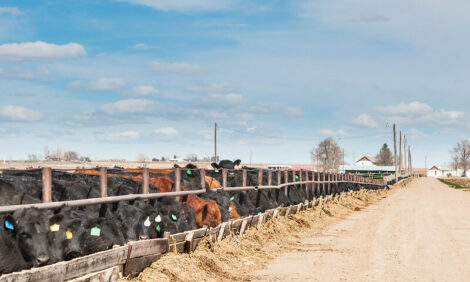



Detection of Bluetongue 8 in the UK reinforces the need to consider vaccination
News of Bluetongue serotype 8 entering the UK reinforces the need for farmers to consider vaccinating their stock in order to protect them from the midge-borne virus.Bluetongue-8 has been detected in a number of animals from a group of 32 cattle imported from an area in France where infection has been confirmed. The Animal and Plant Health Agency (APHA) has identified the disease in cattle in Preston and Kendal and at two locations in Scotland.
Bluetongue is spread by the Culicoides biting midge and is a notifiable disease. The vector-borne nature of Bluetongue means that where infection is present and circulating, protection is best achieved through vaccination.
Unseasonably high temperatures for October means midge activity is still high, and therefore if the local midge population becomes infected with the bluetongue virus there is a risk that infection could spread to other livestock.
Chief Veterinary Officer for the UK, Nigel Gibbens, has reminded farmers that the disease is still a threat, and advises: “Keepers must remain vigilant and report any suspicions to APHA. They may also want to talk to their vet to consider if vaccination would benefit their business.”
Why vaccinate
Vaccination is the only sure way of protecting livestock against bluetongue, explains Carolyn Hogan, National Veterinary Manager at Zoetis.
“Although we are coming to the end of the midge season, with midge activity at its highest when the average daily temperature is above 15C, the current unseasonably high temperatures mean midges are still active. This means there is a risk they could have picked up bluetongue virus from the infected imported cattle before these animals were humanely culled.
“At the moment we simply don’t know whether or not this is the case. Local surveillance has been put in place to monitor livestock in the local vicinity, and this will determine whether or not infection has spread, and therefore whether or not there is a disease risk to UK livestock.”
Should infection be found to be actively circulating, in an attempt to control wider spread of infection, movement restriction zones of 150km will be placed around infected premises. These movement restrictions can have a devastating impact on a farmer’s ability to trade.
She adds: “Whilst some animals may show very few clinical signs, bluetongue can cause severe disease in sheep and cattle negatively impacting productivity, through for example reduced milk yield, infertility, and lameness. Vaccination will help protect against the production losses, and importantly reduce the impact of any movement restrictions allowing trade to continue.”
The vaccines available for protection against Bluetongue serotype 8 are Zulvac® 8 Ovis for sheep, and Zulvac® 8 Bovis for cattle.
Vaccination of both sheep and cattle with Zulvac requires two doses, given three weeks apart, with protection in place 25 days after the second vaccine dose. It therefore takes just over 6 weeks from starting the vaccine course to the animal being protected. Vaccine can be given to sheep from 6 weeks of age, and cattle from 3 months of age, and both vaccines are licensed to be used during pregnancy.
Ms Hogan advises that farmers should discuss with their vets an individual risk assessment for their farm. This will allow a proactive approach to managing the risk from bluetongue, which may involve use of vaccination.
About Zoetis
Zoetis is the leading animal health company, dedicated to supporting its customers and their businesses. Building on more than 60 years of experience in animal health, Zoetis discovers, develops, manufactures and markets veterinary vaccines and medicines, complemented by diagnostic products, genetic tests, biodevices and a range of services. Zoetis serves veterinarians, livestock producers and people who raise and care for farm and companion animals with sales of its products in more than 100 countries. In 2016, the company generated annual revenue of $4.9 billion with approximately 9,000 employees. For more information, visit www.zoetis.com.
| TheCattleSite News Desk | Read more Zoetis News here |



